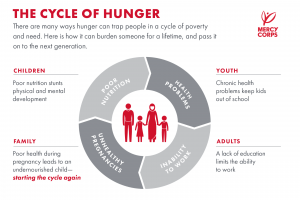 Sitting in the last bits of daylight, eyes closed, I calmly take deep breaths. Slowly inhaling through my nose, exhaling through my mouth. I’m concentrating on the emptiness inside of me, I’ve been fasting for almost 24 hours. Is this hunger I think to myself? No, it is not, being hungry means more than just missing a meal. It’s a debilitating crisis that has more than 820 million people in its grip.
Sitting in the last bits of daylight, eyes closed, I calmly take deep breaths. Slowly inhaling through my nose, exhaling through my mouth. I’m concentrating on the emptiness inside of me, I’ve been fasting for almost 24 hours. Is this hunger I think to myself? No, it is not, being hungry means more than just missing a meal. It’s a debilitating crisis that has more than 820 million people in its grip.
Hunger is a perilous cycle that passes from one generation to the next. Families who struggle with chronic hunger and malnutrition consistently go without the nutrients their minds and bodies need, which then prevents them from being able to perform their best at work, school, or to improve their lives.
So why are people hungry? This is a complex question, but hunger is a byproduct of food insecurity, which is defined as being “unable to consistently access or afford adequate food.” A number of factors such as poverty, climate change, price fluctuations, distribution networks, and food waste all play a role in food insecurity. There is no silver-bullet solution and each region or community needs its own tailored fix. Though many agree that closing the yield gap, using fertilizers more efficiently, raising low water productivity, and reducing food waste would all go a long way in helping to reduce food insecurity.
Suddenly my mind begins spinning, my breathing hastens. This problem seems so overwhelming, what am I a poor student suppose do about this? I slow my breathing and say to myself “you don’t have to be responsible for solving the world’s problems but taking a moment to contemplate and be mindful is at least a step in the right direction.” Contemplative practices can be helpful in metaphorically dipping your toe into complex problems. They allow you to examine your place within a living system while not overly internalizing it.

Thank you so much for sharing this article with us! It was incredibly helpful and insightful. I’m eagerly looking forward to reading more articles like this one. Your content really enriches my understanding and adds great value. Keep up the fantastic work!
lightroom instagram presets
Thank you very much for sharing this aticle with us! it was very helpful. Looking forward to reading more articles like this one!
Tankardstown House Wedding : A Classic Venue Guide for Couples
For lessons on the history of small nations, we studied the small nations of Africa. I was once asked to write an essay on the topic “the problem of hunger in Africa” and since the work was extensive, I ordered it from the essay writers for hire service, who wrote it for me. I wouldn’t even physically be able to write it, because when I even think about how the children are starving there, I feel uneasy.
Rolex è uno dei pochi marchi di orologi di fascia alta il cui nome aziendale non è coerente con il nome del fondatore, perché il leggendario nome di Wilsdorf “Rolex” deriva dall’abbreviazione della parola “orologio” (orologio di prestigio), è diventato un orologio di qualità sinonimo di orologi replica rolex. è anche un nome semplice che è facile da pronunciare ovunque e da chiunque.
Penso che gli orologi replica siano una buona scelta per coloro che vogliono risparmiare denaro e avere un orologio elegante e lussuoso. Offrono lo stesso aspetto degli orologi di design originali a un costo molto inferiore. Inoltre, con una vasta gamma di stili e colori tra cui scegliere, puoi sempre trovare l’orologio perfetto per ogni occasione.
https://www.orologilusso.eu/
is a drug used to improve male function. But abnormal symptoms may occur when taking it. 비아그라구입 This is necessary information for a healthy sexual life and how to respond.
I was looking for another article by chance and found your article I am writing on this topic,
so I think it will help a lot. I leave my blog address below. Please visit once.
제이나인 먹튀 신고
제이나인 카지노 먹튀
제이나인 토토 사이트 모음
제이나인 토토 총판
제이나인 토토 하우스
https://www.j9korea.com
I too felt that the contemplative practices involving hunger awareness were incredibly effective in communicating their point. Actually understanding hunger, and the emotional component tied to it is perspective-shifting.
I completely agree with your idea that solving hunger is not a “one-size-fits-all” solution. But there is general agreement that food waste is one area that is problematic no matter where it is.
Tristram Stuart talks about the “global scandal” of food waste and how it has devastated hungry communities. He points out that countries with higher GDPs and higher food production are more likely to waste more food. So not only is hunger an environmental issue, but an economic one as well. Poverty and hunger typically go hand-in-hand, so we see more hunger in poorer countries.
America, on average, has four times what is required to keep us from going hungry, according to Stuart. What could we, as Americans, do to bridge this gap between consumption and waste? Farmers will throw away 1/3 of their harvest because of cosmetic standards.
Should this food be collected and distributed to other countries? Is that a likely solution we could see happening? And would it work?
These are the questions we can ask and investigate more thoughtfully once we experience hunger not just physically but emotionally.